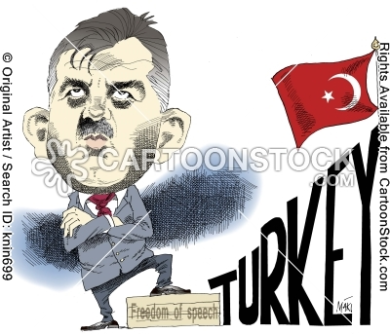Last week in class we discussed TV and TV shows and how readily available they are to those who live in the MENA region as well as the effects TV has on them. We talked about how their TV habits were not so different for ours here in the U.S. Sure, those with TV access watch the news, but they love their soap operas, dramas, comedies and reality shows just as much as we do. They look to TV for entertainment and as an escape from reality, just like us. And, just like us, when government officials make big, potentially detrimental, mistakes they are glued to their TV sets waiting for the next captivating moment to unfold. Currently, Turkey is enjoying a political drama of massive proportions.
Turkish Prime Minister, Tayyip Erdogan (photo)
What is spurring this political crisis? Leaked telephone conversations, of course. In an article published in the New York Times, Tim Arango reports on this present Turkish corruption scandal. This scandal came to a climax Monday night when a wiretapped conversation, allegedly between the Turkish Prime Minister, Tayyip Erdogan, and his son was leaked. During this conversation the Prime Minister is supposedly heard instructing his son to get tens of millions of dollars out of the house because he fears an impending investigation.
This dramatic event caused the Turkish people to rush to social media platforms and thus government censors had an influx of work. This led to the original leak being taken down from the Internet. However, the Prime Ministers office made a statement saying that, “Phone recordings published on the Internet that are alleged to be between Prime Minister Recep Tayyip Erdogan and his son are a product of an immoral montage that is completely false.” This did not weaken the public’s fascination though. People have stayed glued to twitter and the TV trying to stay on top of the latest reports. One of the reasons the Turkish people are so riveted by this scandal is because they are uneasy to the consequences that may come of it. This is not unusual given the political unrest in the country. According to the Times article many analysts have said that Erdogan’s supporters are deeply enough involved in the Turkish state to be able to “do a great deal of damage”.
Although, here in the U.S. we are not accustomed to living in a constant state of limbo over whether or not our government will do something radical, we can sympathize with the Turkish people in that we have become “desensitized” to a certain extent to governmental scandals. As much as it pains me to admit, if I received a CNN alert to my phone that a congressman, senator or political leader had sent out naked pictures of himself or has said something abhorrently offensive I probably would not even open up the app to get the details. In light of this he best thing we can do, I suppose, is to hope that political leaders on all ends of the globe start concerning themselves more with the state of their nation and less about power and all that comes with it as a result.







